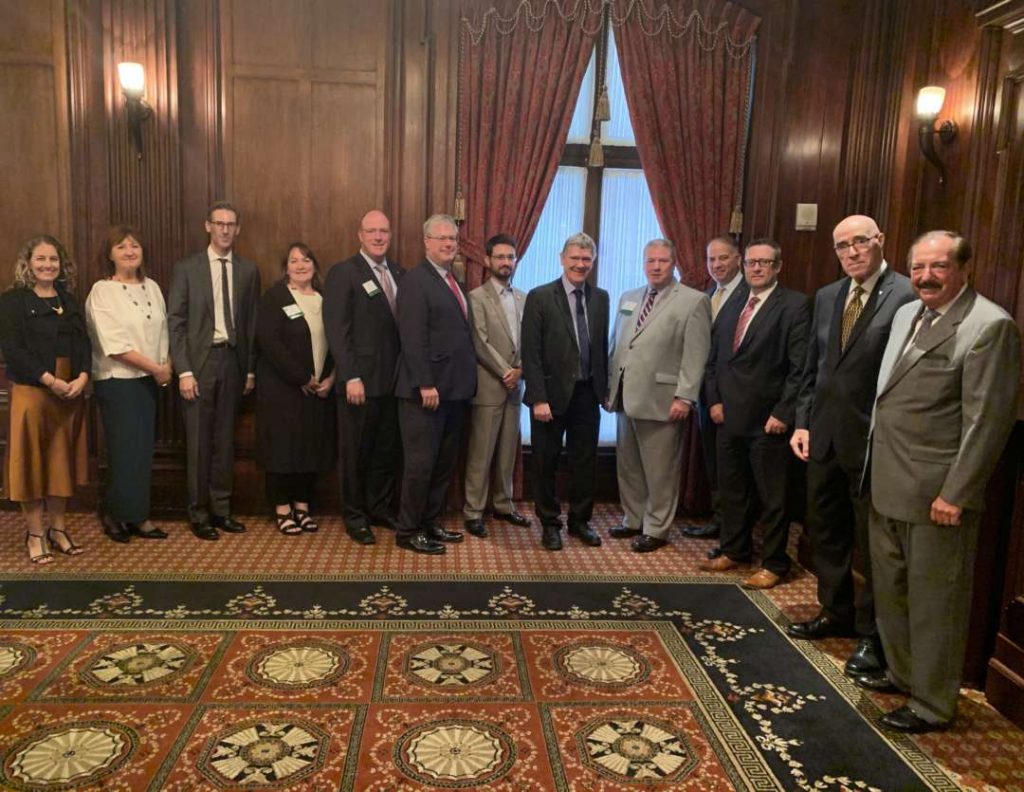BREXIT ON THE MENU AS IRISH BUSINESS CHAMBER HOSTS NORTHERN IRISH DIPLOMAT
It’s one man’s job to take the long view, to inform Northern Irish government officials of the range of possibilities, depending on that eventual outcome.
Dr. Andrew McCormick, director of general international relations, is Northern Ireland’s senior civil servant. He spoke before the Irish American Business Chamber & Network in Philadelphia recently to share what he knows—about Brexit’s potential impact on the peace process and how the lingering political uncertainties might affect the border between Northern Ireland and the Republic, along with the impact on the economy and U.S. businesses that have headquarters or operations in the north.
In a conversation before the roundtable, McCormick explained his mission during his stateside tour of Irish organizations.
“The challenge of Brexit is a big, big issue, very challenging with all the very unsettling events in London. It’s a uniquely strange scenario at this time,” said Dr. McCormick. “We’re working to make sure there is a good understanding of what’s happening—where there are opportunities for Northern Ireland, how we make sure that is understood and the strengths of our economy. And then also an awareness of the challenges in the present context.”
The border—whether that border will remain open, as it is now, or with checkpoints and controls—is a massive issue throughout the long debate over the United Kingdom’s eventual departure from the European Union and its desire to be free of EU control. The border is the principal stumbling block, with implications for the survival of the peace process, so arduously hammered out in the Good Friday agreement. The EU is insisting on adherence to the so-called Irish backstop, which would provide for a continuation of the open border between the North and the Republic of Ireland.
“People thought the border would remain as it is,” said McCormick. “Brexit changes that if Brexit leads to visible controls (at the border). There are two levels to that. One is an impact on citizens and businesses. There’s a lot of economic integration between the two parts of Ireland, which is a very positive thing. And then there’s the other thing, which is the political side of it. If there becomes a sense that there is a stronger feeling about partition, that’s politically and incredibly sensitive and difficult. Part of the problem is, for the UK to leave, all parts of the UK would be treated as a Unionist would want. That’s also very difficult.
“My perspective is, the only way forward is to look at something that can be agreed. The Good Friday Agreement was a hard and difficult agreement. It involved incredible courage from both sides—all sides, really, since it’s a multiparty agreement. And people made big choices. The only way this will be solved is through leaders agreeing. For that to happen doesn’t look strong at the moment, but it’s the only way forward—and the time is so short.”
If McCormick’s job sounds tough, that’s because it is. He concedes that it’s challenging and sometimes frustrating, but at the same time it’s enjoyable. However, because the Northern Ireland Executive—the government of Northern Ireland—collapsed in 2017, that presents its own unique set of challenges.
“We have no minister, so there’s no collective political majority to say, here’s the Northern Ireland view backed by a democratic process,” he said. “All we can do as civil servants is offer factual analysis and advice, and we do our best to do that. But it doesn’t carry anything like the weight that a political voice would carry.”


